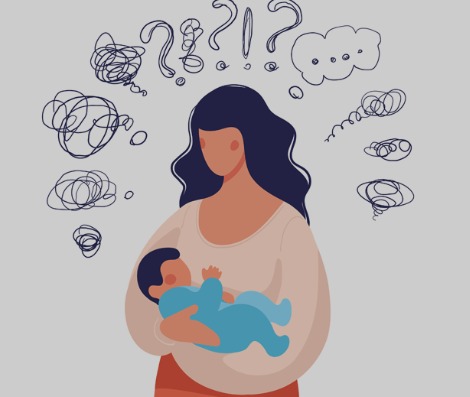The journey of motherhood is often depicted as a joyous and fulfilling experience. However, behind the scenes, many new mothers face an emotional battle that goes beyond the picture-perfect moments—the struggle with postpartum depression. Postpartum depression (PPD) is a serious mental health condition that affects many women after giving birth. In this blog, we’ll delve into the realities of postpartum depression, its causes, symptoms, and most importantly, ways to cope and seek support.
Understanding Postpartum Depression
Postpartum depression is a type of clinical depression that occurs after childbirth. It’s important to differentiate between the “baby blues,” which is a milder and shorter-lived emotional state that many new mothers experience, and postpartum depression, which is a more severe and long-lasting condition.
The causes of postpartum depression are complex and can be a combination of hormonal changes, genetic predisposition, psychological factors, and external stressors. The sudden drop in estrogen and progesterone levels after childbirth can contribute to mood swings, while the demands of caring for a newborn can lead to physical and emotional exhaustion.
Signs and Symptoms
The symptoms of postpartum depression can vary in intensity and duration, but they often include:
- Persistent feelings of sadness, hopelessness, or emptiness
- Severe mood swings and irritability
- Loss of interest or pleasure in activities
- Changes in appetite and sleep patterns
- Overwhelming fatigue or loss of energy
- Feelings of guilt, worthlessness, or inadequacy
- Difficulty bonding with the baby
- Trouble concentrating or making decisions
- Thoughts of self-harm or harming the baby
It’s crucial to note that postpartum depression is not a sign of weakness or a reflection of a mother’s love for her child. It’s a medical condition that requires understanding, support, and treatment.
Seeking Help and Treatment
If you or someone you know is experiencing postpartum depression, seeking help is essential. Many women hesitate to talk about their feelings due to societal pressure or fear of judgment. However, reaching out for support is a courageous step towards healing.
Treatment options for postpartum depression include:
- Therapy: Cognitive-behavioral therapy (CBT), interpersonal therapy, and other forms of talk therapy can provide a safe space to address and manage the emotional challenges.
- Medication: In some cases, healthcare professionals might recommend antidepressant medication to help regulate mood. It’s important to consult a doctor before making any decisions about medication, especially if breastfeeding.
- Support groups: Connecting with other mothers who are experiencing or have experienced postpartum depression can offer a sense of community and shared understanding.
- Lifestyle adjustments: Prioritizing self-care, maintaining a balanced diet, regular exercise, and ensuring sufficient sleep can contribute to improved mental well-being.
- Involvement of loved ones: Partners, family members, and friends play a crucial role in offering emotional support and assistance with childcare responsibilities.
Conclusion
Postpartum depression is a reality that many new mothers face, and it’s crucial to shed light on this topic to break the stigma surrounding mental health. Remember that seeking help is a sign of strength, not weakness. If you or someone you know is struggling with postpartum depression, know that you are not alone. With the right support, treatment, and understanding, it is possible to navigate the depths of postpartum depression and emerge stronger on the journey of motherhood.




